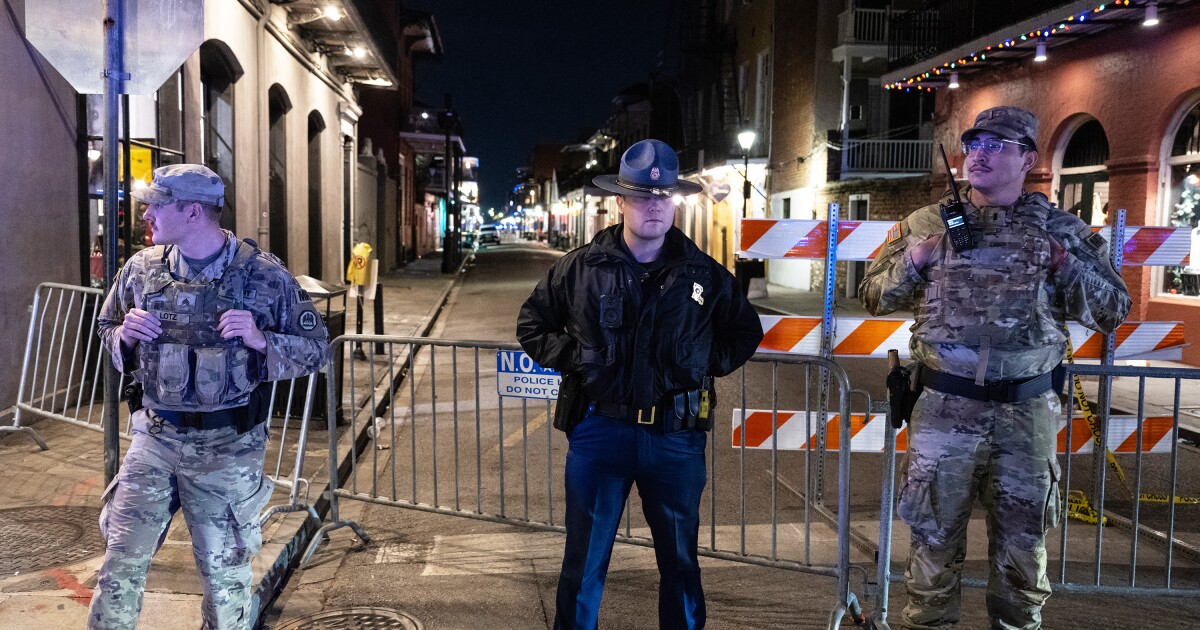One suspect in the two New Year’s Day incidents being probed as terror attacks was a former U.S. Army sergeant from Texas who recently worked for Big Four firm Deloitte. The other was a U.S. Army special forces sergeant from Colorado on leave from active duty.
Law enforcement officials on Thursday said there appears to be no definitive link between the two deadly events: a truck attack in New Orleans that left at least 15 dead and the explosion of a Tesla Cybertruck outside of President-elect Donald Trump’s hotel in Las Vegas that killed the driver and injured seven.
But in addition to the military backgrounds of the suspects — they both served in Afghanistan in 2009 — on the day of the attacks they shared at least one other striking similarity: Both men used the same rental app to obtain electric vehicles.
The driver of the Cybertruck was identified as Matthew Alan Livelsberger of Colorado Springs. He rented the Cybertruck on Turo, the app also used by Shamsud-Din Jabbar, the suspect in the separate attack in New Orleans hours earlier. Turo said it was working with law enforcement officials on the investigation of both incidents.
There are “very strange similarities and so we’re not prepared to rule in or rule out anything at this point,” said Sheriff Kevin McMahill of the Las Vegas Metropolitan Police Department.
The gruesome assault on revelers celebrating New Year’s in New Orleans’ famed French Quarter and the explosion in Las Vegas thrust U.S. domestic security back into the spotlight just weeks before Donald Trump is sworn in as president.
Texas roots
As authorities combed through the macabre scene on Wednesday in New Orleans’ historic French Quarter, they said they discovered an ISIS flag with the Ford F-150 electric pickup truck that barreled through the crowd. Two improvised explosive devices were found in the area, according to the FBI.
Jabbar had claimed to join ISIS during the summer and pledged allegiance to the group in videos posted on social media prior to the attack, according to the FBI. An official said there’s no evidence that ISIS coordinated the attack.
Officials said the 42-year-old Jabbar, who lived in the Houston area, exchanged fire with police and was killed at the scene.
Jabbar has said online that he spent “all his life” in the Texas city, with the exception of 10 years working in human resources and information technology in the military, according to a video promoting his real estate business.
After serving as an active-duty soldier from 2006 to 2015 and as a reservist for about five years, Jabbar began a career in technology services, the Wall Street Journal reported. He worked for Accenture, Ernst & Young and Deloitte.
Jabbar was divorced twice, most recently from Shaneen McDaniel, according to Fort Bend County marriage records. The couple, who married in 2017, had one son, and separated in 2020. The divorce was finalized in 2022.
“The marriage has become insupportable due to discord or conflict of personalities that destroys the legitimate ends of the marital relationship and prevents any reasonable expectation of reconciliation,” the petition stated.
McDaniel kept the couple’s four-bedroom home southwest of Houston. She declined to comment when contacted at her house in suburban Houston.
Fort Bragg
Jabbar moved to another residence in Houston, which the FBI and local law enforcement spent all night searching before declaring the neighborhood of mobile homes and single-story houses safe for residents. Agents cleared the scene shortly before 8 a.m. local time without additional comment.
Jabbar’s mobile home is fronted by an 8-foot corrugated steel fence that was partially torn apart to provide search teams access. Weightlifting equipment and a bow hunting target were scattered across the broken concrete walkway. Chickens, Muscovy ducks and guinea fowl roamed the property.
Behind the home, a yellow 2018 Jeep Rubicon sat with its doors left wide open and a hardcover book written in Arabic sitting atop the dashboard. The license plate expired in May 2023.
The other suspect, Livelsberger, was a member of the Army’s elite Green Berets, according to the Associated Press, which cited unidentified Army officials. He had served in the Army since 2006, rising through the ranks, and was on approved leave when he died in the blast.
Livelsberger, 37, spent time at the base formerly known as Fort Bragg, a massive Army base in North Carolina that’s home to Army special forces command. Jabbar also spent time at Fort Bragg, though his service apparently didn’t overlap with Livelsberger’s.
Las Vegas Sheriff McMahill said they found his military identification, a passport, a semiautomatic, fireworks, an iPhone, smartwatch and credit cards in his name, but are still uncertain it’s Livelsberger and are waiting on DNA records.
“His body is burnt beyond recognition and I do still not have confirmation 100% that that is the individual that was inside our vehicle,” he said.
The individual in the car suffered a gunshot wound to his head prior to the detonation of the vehicle.


 Personal Finance1 week ago
Personal Finance1 week ago
 Economics1 week ago
Economics1 week ago
 Economics1 week ago
Economics1 week ago
 Blog Post6 days ago
Blog Post6 days ago
 Economics1 week ago
Economics1 week ago
 Personal Finance1 week ago
Personal Finance1 week ago
 Economics5 days ago
Economics5 days ago
 Economics7 days ago
Economics7 days ago











